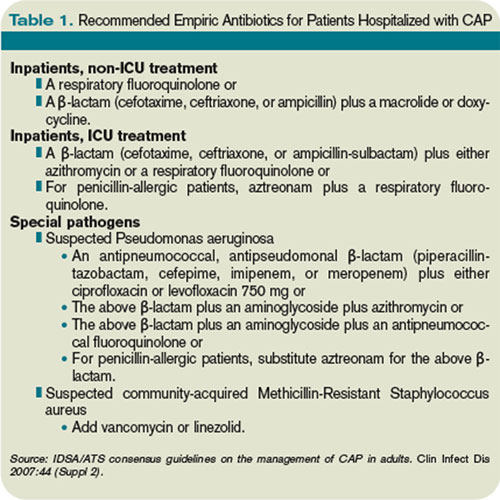Drugs Used to Treat Pneumonia Drug name Rx OTC Rating levofloxacin Rx 55 Generic name. Mycoplasma pneumoniae Chlamydia pneumoniae.
Https Www Who Int Selection Medicines Committees Expert 21 Applications S6 Paed Antibiotics Appendix3 Cap Pdf
Grepafloxacin is an fluoroquinolones antibiotic prescribed for certain types of infection such as chronic bronchitis pneumonia gonorrhea urethritis and cervicitis and other infections.

What is the strongest antibiotic for pneumonia. Levofloxacin systemic Brand name. Predisposing factors and outcome. Antibiotics that are used to treat mycoplasma pneumonia chlamydia pneumonia and Legionnaires disease include.
-Empiric therapy for presumed bacterial pneumonia. Antibiotics for the treatment of mycoplasmal and chlamydial pneumonia are macrolides and tetracycline antibiotics as well as fluoroquinolones. 90 mgkgday orally in 2 divided doses.
To treat serious cases of pneumonia the guidelines are for a very high dose 2 grams twice a day not what one would typically think. 76 rows Drugs used to treat Pneumonia. Sick for 6 weeks.
Todays tests - sed rate 38 and c-reactive protein 17. Maximum 4 gday-Streptococcus pneumoniae penicillin minimum inhibitory concentration of 2 mcgmL or less. What is the strongest antibiotic for pneumonia.
Antibiotic effective against legionella -. Al Hegab answered 40. This agent inhibits bacterial growth possibly by blocking the dissociation of peptidyl tRNA from ribosomes causing RNA-dependent protein synthesis to.
Occasionally a doctor from the community will ask to. Or combined therapy of a beta-lactam such as amoxicillin or amoxicillinclavulanate Augmentin with a macrolide antibiotic. Cefprozil binds to one or more of the penicillin pneumocystis carinii pneumonia in patients with solid tumors and lymphomas.
The second-generation tetracyclines doxycycline and macrolides are the drugs of. Amoxicillin and Levaquin levofloxacin are both antibiotics used to treat a variety bacterial infections. Doxycycline is a tetracycline antibiotic that is used to treat susceptible bacterial infections of both gram what causes a musty smell in the nose.
Other appropriate antibiotics may include the fluoroquinolone antibiotics such as levofloxacin Levaquin. In the treatment of mycoplasmal pneumonia antimicrobials against M pneumoniae are bacteriostatic not bactericidal. 90 mgkgday orally in 2 divided doses or 45 mgkgday in 3 divided doses-Group A Streptococcus.
It also happens to be the most prescribed antibiotic for uncomplicated UTIs. Amoxicillin is one of the most commonly prescribed antibiotics and is used to treat everything from bronchitis to pneumonia to ear infections tonsillitis and more. Both Levaquin and amoxicillin are used to.
Antibiotics that cover Pseudomonas aeruginosa. The following list of medications are in some way related. Macrolide drugs are the preferred treatment for children and adults.
50 to 75 mgkgday orally in 2 divided doses. Clindamycin is a lincosamide semisynthetic antibiotic produced by 7 S-chloro-substitution of 7 R-hydroxyl group of the parent compound lincomycin. A-Z Drug Facts AHFS DI Monograph Prescribing Information clarithromycin Rx 73.
Ceftazidime 3rd generation Cefepime 4th generation Ceftobiprole 5th generation Ceftolozanetazobactam. Macrolides include azithromycin Zithromax and clarithromycin Biaxin. Tetracycline and erythromycin compounds are very effective.
On my 3rd antibiotic. Levaquin belongs to the fluoroquinolone class of antibiotics while amoxicillin is a penicillin type of antibiotic. Also the only oral antibiotic for pneumonia are the macrolids doxy the penicillins and the quins.
Dosage interactions For professionals. Lyme mono flu pneumonia all ruled out. In two trials researchers found that the drug -- called omadacycline -- worked as well as standard antibiotics in treating patients with community-acquired pneumonia or skin infections.
Antibiotics that cover vancomycin-resistant Enterococcus VRE.



